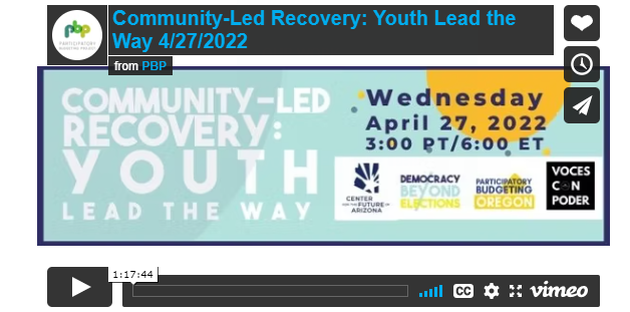 About Participatory Budgeting: Participatory budgeting (PB) is a democratic process in which community members decide how to spend part of a public budget. It gives people real power over real money. PB started in Porto Alegre, Brazil, in 1989, as an anti-poverty measure that helped reduce child mortality by nearly 20%. Since then PB has spread to over 7,000 cities around the world, and has been used to decide budgets from states, counties, cities, housing authorities, schools, and other institutions. The New York Times calls PB “revolutionary civics in action”— it deepens democracy, builds stronger communities, and creates a more equitable distribution of public resources. About ARPA: The American Rescue Plan (ARPA), was passed by congress to assist communities after the disastrous impacts of COVID-19. The Participatory Budgeting Project as partnered with Democracy Beyond Elections, Center for the Future of Arizona, and Voces con Poder to convene youth leaders, elected officials and school administrators working to bring community-led decision-making into budget decisions that impact young people. From PBP's blog: During our 4/27 webinar, student leaders shared inspiring presentations on their local participatory budgeting processes. This included grounding in how PB works in their local context, as well as personal reflections on how PB impacted their leadership. “It was intimidating at first when I joined as a freshman,” recalled student leader Anissa from Sunnyside’s Desert View High School. “As a sophomore a year later, [PB] really helped me follow what I want to do and put my own self out there.” This exciting event allowed for collaboration, deliberation, and understanding. Many more events like this ARPA funding event are being led by youth.
0 Comments
Your comment will be posted after it is approved.
Leave a Reply. |
Categories
All
|
Follow Us
ABOUT NCDD
NCDD is a community and coalition of individuals and organizations who bring people together to discuss, decide and collaborate on today's toughest issues.
© The National Coalition For Dialogue And Deliberation, Inc. All rights reserved.
© The National Coalition For Dialogue And Deliberation, Inc. All rights reserved.

 RSS Feed
RSS Feed